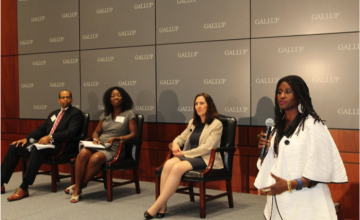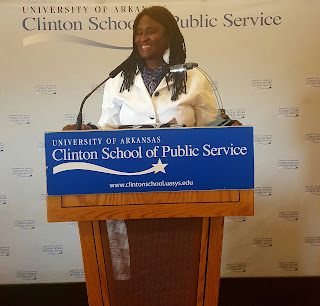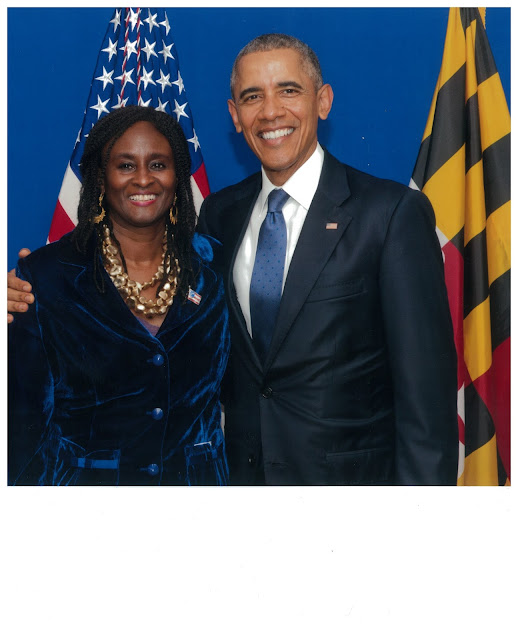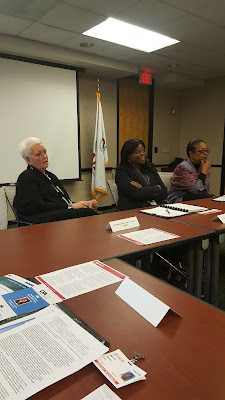 |
Ambassador Sanders - Medgar Evers
College Keynote Speaker for International
Women's Day 2016.
Theme: Women Empowerment |
Working with African Communities Toward Sustainable Development & the Key Role of Gender Equality
Keynote Speech
By
Ambassador Robin Renee Sanders
Medgar Evers College, March 10, 2016
Good morning. I am delighted to be here
today, and in particular this week on the dawn of celebrating this year's International
Women's Day, which was March 8. The theme the United Nations had given to
International Women's Day this year was – "Planet 50:50 by 2030" --
meaning global positives for women and girls should be on the same footing as
they are for males by the year 2030. This "2030" date is going to
feature a lot in my remarks today because it also the seminal date agreed to at
last year's UN Session by 197 world leaders, including President Obama, to
achieve these "five" main global Sustainable Development Goals, or
SDG's.
So what do these two things really mean
-- Gender Parity and Sustainable Development Goals;
What are the key elements therein that
African Communities face;
What are some of the things donors,
like the United States can help do to address Africa's development needs as
outlined in the global SDG's; and,
Why should "helping' be important
to us given the range of issues we face here at home– such as black lives
matter, poverty in many communities – be they Black, Latino, White
(proportionally more so for the former two); a fractured criminal justice
system, and are own economic challenges right here in America.
Africa Emerging Continent, African
Leader Nations:
-- So let’ start with
answering these questions – why is this region of the world important, and what does this region mean for and
to the United States of America as a strategic political, economic, investment
and cultural partner. In other words: What
are the elements of the US-Africa relationship?
-- If we look at the main themes of current US-Africa relationship,
I believe you will see why the Region is vital to the U.S. now and for the foreseeable
future:
The overarching themes of the U.S. Government -Africa
relationship are:
-- Investing in Africa’s future;
-- Peace and Regional Stability; and,
--
Governing for the Next Generation (meaning focusing on Africa's youth and its
future leaders)
-- In the end, it's all about demographics, really. But let me
be clear when I say demographics I am not talking strictly about population
figures (although key), but I see regional demographics as a national security
and national strategic foreign policy issue. Thus, what I mean by demographics is – everything that is both measurable
and non-measurable (e.g. perceptions) that impacts outcomes and geo-political
relationships – this includes:
· Population sizes and breakdowns by age
and gender to;
· World resource locations (where the oil,
timber, jobs, lack of jobs, etc., land and water resources are to;
· In-country regional and religious
differences or groups that might impact world views, encourage conflicts,
affect perceptions of an action or statement/cartoons (French, Danish examples);
and,
· The “Singularity” of individual
influences (e.g. Pope Francis=positive, Putin=challenge, Malala=young Afghani
women; Graca Michel=African women)
These are the basket of
demographic elements that require the U.S. to see Africa today as an important
Region to engage with properly and to cultivate positive partnerships.
A Closer Look @ SSAfrica's
Geo-Political Demographics:
Taking a closer looks at the specific figures here are some to
help put the basket of Africa's
demographics into perspective as to the …. what, … the why, …. and the good
news and the challenges as regards to the 48 countries in the Sub-Saharan Region.
Let's start with the population figures and go from there:
-- Africa’s population today is reportedly
1.1 billion people and
it is on course to reach 2.4 billion people by 2050. Its current average yearly growth rate is 2.45 per cent, which
will likely be higher than that over the next decades.
--The most significant sub-figure, in
the Continent-wide population numbers I just cited, is the figure on youth/young
people (ages 10-34), representing about 50 percent
(or 600 million people). This figure will continue to grow over the next
two decades. I am emphasizing this sub-figure because I see it as Africa's "population
dividend." Meaning for me it is a positive (but of course it has the
potential to be problematic if certain development issues are not addressed
more).
These population
stats will move Africa, in the next decade, from the third most populated region
in the world to the largest. But, most of its people, particularly women and
girls, could remain below the poverty or extreme poverty level if current
development efforts do not triple between now and that seminal date of "2030," where
both the parity effort (Planet 50:50) in support of women/girls, and the five
main Sustainable Development Goals (SDG's), I mentioned earlier are supposed to
dove tail.
So what
are these "Five Key SDG's" (with their 167 targets) all about and
where do women and girls fit in and what are their needs. I am sure you can
guess many of them, but I do want to give you the current context.
I was a delegate at the 2015 United
Nations session, and participated in discussions on the roadmap for the success
of the SDG's over the next 15 years to further cut the pillars of extreme
poverty.
Keep that term in mind –
the focus is on extreme poverty, so it is unclear to me if a distinction is
being made between "extreme poverty" and "poverty," but if
you have travel around the United States and overseas, as I have, and probably
many of you, extreme poverty and/or poverty are relative terms for people
struggling every day to have affordable, adequate shelter and access to health
care, feed their children and provide them with an education, have potable
water to drink, and fundamentally feel and be safe in their living environments.
Hence, the Five Key SDG Pillars
are:
1.) Leave No One Behind. No person –
regardless of ethnicity, gender, geography, disability, race or other status,
should be denied basic economic opportunities and human rights.
2.) Put Sustainable Development at Core -integration
of social, economic and environmental dimensions (includes-slowing climate
change, environmental degradation)
3.) Transform Economies for Jobs &
Inclusive Growth – includes improving livelihoods, harnessing
innovation, technology, diversified economies, providing equal opportunities,
drive social inclusion, especially for young people. (Entrepreneurship)
4.) Build Peace and Effective, Open and
Accountable Institutions - Freedom from conflict and violence –a basic human
entitlement, which includes honest, responsive & accountable governments.
And;
5.) Forge New Global Partnerships - Shared humanity, mutual respect, inclusion
(especially for poor & at-risk people (e.g. women, youth, aged, disabled
persons & indigenous people). New global partners include expanding
outreach to civil society organizations, multilateral institutions, local and
national governments, scientific, academic, business communities &
philanthropic persons or organizations.
With these new pillars from my perspective
there was a realization that for women/girls more needed to be done to address
their specific challenges and also more need to be done in turn for regions
like Africa and South East Asia – home to some of the world's most serve human
index indicators.
The SDG's added:
-- A New emphasis on gender,
-- A New emphasis on well-being
-- A New emphasis on climate change
-- A New emphasis on freedom from conflict
-- A new emphasis on how conflicts and natural
disasters affect women/girls more.
Furthermore, the key backstory and some
factoids you need to know as to why this new emphasis on women and girls is so important
is because:
-- Women make up large portion of the developing world labor force, 50
percent in Africa alone;
-- Women farmers, who do most of the agricultural work world-wide, would be
more productive if they had more access/ownership of land, tools, credit; and,
-- Because if women had land, agricultural tools, and access to financial credit
they could do 2 things: increase agricultural yields by 20-30 percent which in turn could
reduce world hunger by 150 million people;
-- Women are the majority out of the financial/economic sector – estimates are this represents about 1 billion
women.
-- For example in East Africa and South Africa only 24-30 percent of
businesses are women-owned or operated [VI];
-- Women face at least one legal restriction against them in 90 countries
around the world [VII];
-- Global figure of girls out of school is about 121 million, 60 % of that
figure is in SSAfrica. And, many countries still do not consistently implement gender-focus education
efforts, although policies might be in place.
-- On Financial Literacy – Only about 15% of women (15yrs+) world-wide have a formal bank account
(World Bank);
-- On Health – maternal mortality and child marriages (12-14yrs) are still high;
-- Living Wage - Most of the world’s poor make 1-2 dollars a day, and women most often make less.
So in sum: Women/girls in the world are the most at-risk, least
educated, most affect by conflict, makeup the greatest refugee, migrants &
IDP's, have the least access to education, and have the least access to
financial literacy and jobs.
Turning to Africa
here, here are some of the specifics stats that will put these extreme poverty
issues into perspective and why the SDG are important for this region and its
challenging human index indicators.
-- 75 million –
current number of young Africans looking for work now, out of the 1.2 billion
working age population world-wide looking for work; Unemployment is also a
world-wide youth issue.
-- 10 million
– number of young Africans of working age added yearly to the 75 million
already seeking jobs(employment according to the African
Union, Political Body of African States);
-- 547-600 million – number
of Africans living without electricity and energy;
-- $1.25 – average amount many Africans live on
per day, with no hopes to change this, [and few
opportunities to improve the quality of life for their families, have access to
education, clean water, and face challenges of poverty every single day;]
-- 847 million/1.2billion – is the
current number of hungry people and/or people living in fear of hunger in the
world today (this includes those in the U.S.);
-- 239 million
of those who are hungry everyday live on the African Continent. (A bit of good
news is this 847 million figure is 209 million less
than two years ago when 1.1 billion people were facing daily hunger);[i]
-- 3 per cent – number of African adults with credit cards; only a
quarter of young African Adults have accounts at a formal financial institution.
Remember I am providing the context as
to why Africa communities are important and that comes with explaining the challenges,
which I have just done, but also sharing with you the positives:
Here are Some of The Positives:
-- 7 out of the 10 fastest
growing economics in the world between 2012-early 2015 were in Africa, although
the economic gains did not reach the
masses. Although, the
lives and prospects of some have changed, and there is a growing middle class),
trickle-down economics must come into play in order to change the lives of the
masses;
-- 90 million people
in the middle (or consuming) class, largest number the region has ever had, up
by 31 million in last
10 years;
-- 736 million –
represents the number of mobile phones in Africa of which Nigeria has 100 million. Africa is the most mobile-ly connected region
in the world.
(One billion mobile
phones on the Continent (NB: World Bank notes six billion mobiles world-wide of which 5 billion are in
the developing world, combining Asia, Africa, and Latin America);
-- 250 million Africans have bank accounts; and,
-- Last but not least, the region
has collectively and potentially a $50 trillion[iii] dollar economy – making it one of the
largest potential markets for U.S. goods, services, investment, trade, and
business relationships.
-- In addition, today there are key Africa nations that see the U.S. in a
positive light, particularly key economic and political powerhouse leader
nations such as South Africa, Nigeria, Ghana, Tanzania, Botswana, Kenya,
Rwanda, Mozambique, and many others.
-- As noted above, I am arguing that these demographics are
strategic issues for the United States as it looks forward in the 21st Century.
The
types of relationships that the U.S. forges with the Continent over the next
decades will be increasingly more important given the global context we live in
today. And how we help address extreme poverty issues at home and abroad will
be important. As abroad, we will need:
·
New Partners on Policy, Partners to build coalitions;
·
Support in International arenas such as the United Nations,
World Trade Organization, Organization of Islamic States, African Union, APEC,
G-77, and G-8;
·
New markets for business and investment
·
Expand and deepen cultural and educational ties
·
And, most importantly the right thing to do not only here in the
U.S., but also abroad wherever and whenever we can aid in reducing poverty
-- Africa is the new frontier now for building a stronger and
better relationship and helping African communities on many of the poverty and
human indicator issues can and should be important elements of our geo-politics,
diplomacy, counter-terrorism, emerging markets, cultural exchanges, and building
new partnerships.
-- Thus, the U.S. leadership is now focusing more
on the region in a way that it never did before – comprehensively and
strategically but most importantly in partnership. Actions and steps over the
last 10 years - in my estimation – have truly laid a better foundation for the
positive footing between the U.S. and Africa Today.
-- Today we have a range of U.S. programs, strategic
partnerships, and educational program, economic and investment relationships
laying the foundation for greater and more comprehensive relations, which are
helping to address the extreme poverty issues on the Continent on one hand, and
supporting the positives I noted above, which are also going on in the Region.
-- We
have a range of new, innovative, and creative economic development programs
(Global Development Lab to help SMEs and entrepreneurs), education (Young
African Leaders Initiative), food security (FEED the Future) and health
initiatives (PEPFAR for HIV/AIDS, Malaria Initiative, and Post Ebola efforts to
create an African-Center for Disease Control) as part of our contribution to
helping to address the SDG issues for the Continent, with a particular emphasis
on women and girls.
-- As
many of you know President Obama hosted in summer 2014 the first-ever U.S.
Africa Summit (never done by any U.S. President, sitting or otherwise),
inviting all the African heads of State to the United States for a
comprehensive forum to discuss democracy, economic, human rights, and
investment issues. He will also hold another business summit with African
nations on September 19, 2016 on the margins of the upcoming United Nations
session.
NEXT STEPS?
-- So what are the next steps?
How do we expand the elements highlighted above and build on the current US-Africa relationship to
secure a positive relationship with Africa’s large "basket
of demographics," particularly since half of the Continent will be
under the age of 35 – in prime education
years, prime wage-earning years, prime years to be influenced by new partners.
-- Given that Africa has this growing "population
dividend" that I described above, we have a role to ensure as much of a "quality
of life level playing field" on helping to address these SDG's issues for
the Continent.
-- Rest assured I am not diminishing the need for us to address
our own domestic issues of extreme poverty right here at home (which, includes things from inadequate
healthcare-to-unemployment-to-education-to-food security and affordable housing). And, I
would argue we probably need to have a similar SDG-like initiative focused just
on our domestic poverty challenges, but unfortunately that is not the case
right now.
In the end, I want you to keep these 4
things in mind:
·
Appreciate the range of demographics I
have shared on Africa's "population dividend," and the positives on economics,
political and natural resources areas;
· Note
that how the U.S. is viewed is connected to the assistance we provide to Africa's
on its development issues.
· Ensure that the next generation of
young Africans sees the U.S. as a friend even if differences may arise on some
policy points from time-to-time.
· Remember
that there are 1.6 million Africans in the Diaspora here in the United States,
who are here because they connect in some way to our values but are still very
much connected back home.
Thus, this is my list of "why" it is importance for
the U.S.to focus on assisting Africa,
particularly at the community-level.
-- However, we need to understand and respect Africa's (and
other region) human cultural differences and their “new global think” on
issues. We have to keep in mind it is a two-way street --meaning we need
to listen better to Africa's perspectives in times of policy disagreement and on
how best to help their communities, and recognize that each country may have its own path to further
solidifying its own democracy.
-- We can seek to share our values and principles without
appearing heavy-handed, and unconcerned about the plight that everyday people
face with the searing demographics I just mentioned.
Where we could do more:
-- Using Information
Technology to develop more “work around solutions" to address social,
health, financial literacy, and educational access by using IT innovation as well as the 736 million
mobile phones on the Continent to do so;
-- Assist with
climate smart agricultural/food security solutions, and developing climate
smart energy answers to bring electricity and energy to the 600 million
Africans without it today; President Obama's Power Africa, and solar solutions
are efforts in this area;
--
Work with governments to continue to improve transparency in political and
economic processes to ensure good governance, reduce corruption, and increase the
capacity of government institutions to handle their nation's social sector needs;
-- Assist with access
to education, including more educational exchange and training programs,
particularly vocational training;
-- Help with the
housing deficit (if you are poor you are also likely not to have good shelter);
-- [Then One of my
biggest issues is] Expanding the number of Small and Medium Size Enterprises
(SMEs) as this will help build the Continent’s middle class from its current 90
million, and increase the number of SMEs from the current 331 million.
-- We all have heard
that there are 28 million SMEs in the US, which help make up our middle class
and are the backbone of our society; for Africa that role for SMEs would be no
different.
-- Neither the United States, nor any other country, is going to be able to provide enough
formal jobs for the large number of African youth looking for jobs – remember I
said the current figure is 74 million today, with 10 million more people added
to that figure every year, so SMEs, entrepreneurs, and vocational training are
going to be key.
-- I believe strongly
that having a living wage through being an entrepreneur or owning a SME, or
having a vocational skill is fundamental to changing these SDG's for the
Region. When one is able to securely provide for one’s self and/or one's family—this
changes the trajectory of a life and of a nation. Remember this will be 600
million young people in the 10-34 years age group over the next several decades.
Thinking Ahead/Think In Time
on The US-Africa:
-- In
sum, as we in the United States lean forward on these challenges I have
highlighted, or look out ahead… at the "basket
of Africa's demographics" and the "array
of today’s geo-political issues," we need to ensure that Africa continues to
move up on our list of key places to be fully engaged at all levels.
So, on my "Lean Forward," list I have these five things:
1.
[Number One] Think
about building more relations based on
partnerships (country-to-country, community-to-community, people-to-people);
2.
Think
about the strategic long term with these emerging African nations, its leaders,
and its people, particularly its young people; this also applies locally. As
you look at your communities and what long term strategic planning you would/could
do?
3.
[Number Three] Think
in Time – Think in parallel and also strategically about
the times in which we live; [What is happening now
that is impacting lives, “what” remains the same, and what changes have long
term implications.]
And last but certainly not least
4. Think about History
- Draw on lessons learned from history in
the process [of doing 1, 2, and 3].
5. Think about the
SDG framework for our challenges here in the U.S. We have these same challenges
and maybe some of the examples and initiatives noted here are useful to those
of you focused on domestic communities and our national next step.
Here is a "Quick
List Check" of some of the main issues I have talked about this morning.
People (no matter where they are in the world) want to:
-- be able to feed,
clothes and house their families;
-- live with dignity and have
respect for their human rights;
-- have access to
affordable health care, housing, and education opportunities for their children;
-- earn a living wage
through job creation or through entrepreneurial, SME, or vocational expression;
-- live in a country with
political transparency, a free press and good governance within recognized legal
and regulatory frameworks, have strong domestic institutions; and, have a reduction/elimination
in corruption.
In concluding,
I hope in the midst of your time here
integrity, fairness, and respect for other cultures are also key “Take-Aways.”
I hope that what I have shared with you today
on the SDG's and their context for women, Africa and even here in the U.S. about
global development needs and human dignity expand your thinking about the world
stage and the domestic front, and particularly about why Africa and its
communities are important to the U.S. THANK YOU
A FEEEDS Series Blog Post
Endnotes:
[i] 9/19/14
CCTV TV live newscast, Miriam Kalma reporting)
[ii] CCTV
9/19/14 live TV newscast Africa Live Report
[iii] UN Week
2014, McKinsey Session on Nigeria, Remarks by Director Richard Dobbs, New York
Palace Hotel, N.Y.
[iv] U.S.
Small Business Regional III Advocate Official Speech, July 10, 2014, Gallup
Headquarters, Washington, D.C. at the FEEEDS-Gallup &
Partners,US-Africa Summit Forum
[v]
2012 speech, Commandant Eisenhower Resources College, National Defense
University, Washington, D.C. on occasion of ICAF College name change
[VI-VII] CCTV March 8, 2016 AfricaLive
News Report for International Women's Day 2016
























